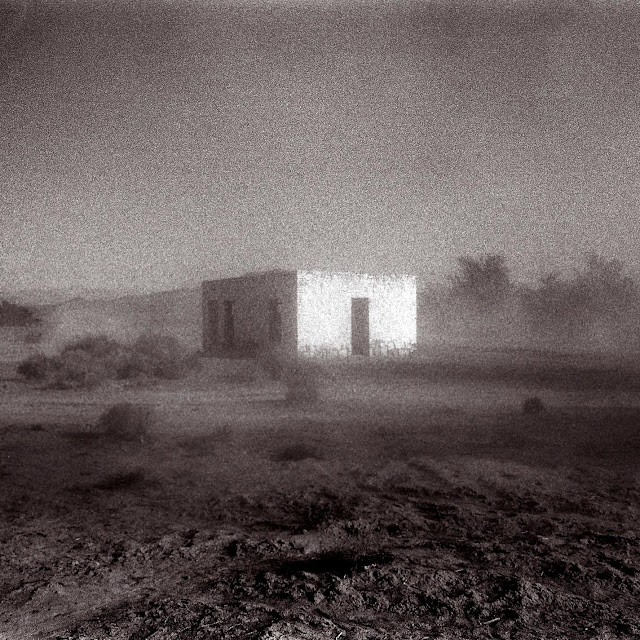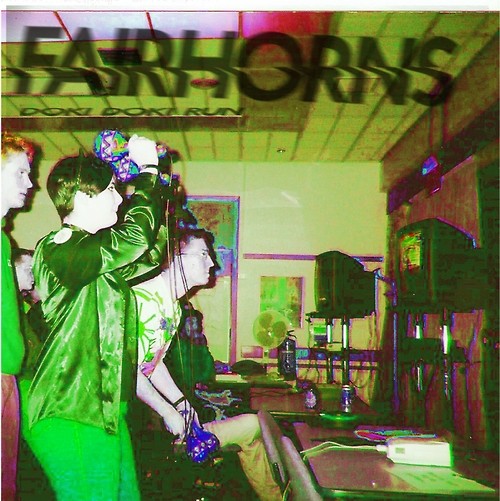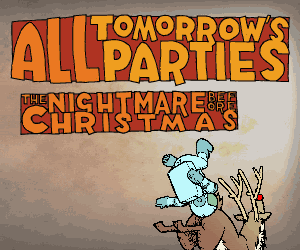Andrew Bird affirms prior to a monumentally grandiose Eyeoneye: "I'd wanna come see a show here" and indeed upon ambling into the Barbican Centre, as ever, tonight carries a sense of the extraordinary. He later quizzes our level of delectation before insinuating we're "maybe too comfortable" sat atop the hall's grand cushions and, in airing latest Break It Yourself in its entirety, one may insinuate that he too is feeling comparably casual.
However prior to the grand unveiling of a quietly special LP is Dosh. Allegedly known to his imaginative begetters and inconclusively to the law as Martin Luther King Chavez Dosh, having toured with Bird for six years or so he's tonight afforded a coveted support slot before a restive bunch. And he in turn demonstrates an ambidextrous, almost machine-like proficiency amidst myriad machines as drums, keys, and synths are contorted into warped samples which are then, to sing to longstanding collaborator Bird's tune, looped gracefully, folded back on themselves like gloopy pastry. Certainly the way in which he erratically exchanges drumsticks for nimble fingers which wiggle atop keyboards recalls the whimsy of a restless child who continues to flitter from one half-hearted instrumental endeavour to another yet given Dosh's ear for sumptuous melody and that his hands, legs, and limbs are fit for a maestro he has plainly grasped every one with irrevocable excellence. Only this Jack of all trades, this master of equal number may know what's thriving within the headphones that plug up his ears although that which sprays from towering speaker sounds, to the deplorably untrained ear, fundamentally imperious.
Meanwhile within moments of his swooping stage-centre, solo, Andrew Bird impetuously lays down a firm slather of Strad-led loop to construct an impalpable orchestra of sorts and simultaneously deconstruct the preconception of the labour of the omnipresent loop pedal as being something of a temporary gimmick. As these layers increase in number and consequent intensity, a rotating gramophone splutters the droning refrain from a wondrously tubular Belles to create divine swathes of textured swells usually heard reverberating off stony church alcoves.
Henceforth, as promised, Bird et al. trundle through Break It Yourself "pretty much as we did it." A record that – by his own concession – "somehow feels more ceremonious than any other record", the concept to diligently work through its tracklisting seems ever more apt. And, if the audience's muted reaction to such an affirmation seems to intimate a latent disappointment, it really oughtn't as for it was released out into the great wide open this very morning we've cause for celebration in place of condemnation. Lusitania, although devoid of Annie Clark's saintly blessing, gleams with a particularly well-polished sheen whilst neo-classical propensities encounter penetrative whistling reminiscent of many a Morricone soundtrack on slumberous jig Hole in the Ocean Floor. Indeed tumid cheeks feature prominently throughout, with Bird tweeting like the chirpiest of puff-chested swallows at times and like an undervalued, trucker-capped gas station attendant replenishing guzzlers churning up Middle America at others. As such, he engenders an altogether helpless impulse to haplessly blow along to an album that may still be unexplored for many. He similarly skims through the evening's set with a formidable proclivity for multitasking and, for a member of the male gender, his ability to immaculately plink striking xylophone resonances while whistling twitter, or to hastily exchange bow for plectrum, is mutedly awe-inspiring.
Thus Bird assimilates a carefree idiosyncrasy in the live setting; his eyes slammed shut, his vocals imbued with a hitherto surreptitious looseness. Perceptibly resembling Luke Wilson from Row P (even adorned in fawn tweed gingerly redolent of that in which Wilson is adorned in Wes Anderson's fabled The Royal Tenenbaums), in spite of the comedic pauses which punctuate each jovial recount he with the fiddle retains an impeccable preciseness and overwhelming professionalism, exhibiting masterful dominance over his preferred strings. Stradivari's capolavoro is masqueraded as an acoustic when strummed on the fancifully intricate Give It Away (the dislocation of chorus from verse albeit accentuated amidst plucked flutters); as the whiffling of feathers when plucked on the gentle creaking of Sifters; and as crestfallen charango twang on the initial moments of opener Desperation Breeds... Lazy Projector, with its lyrical questioning as to who serves as the editor of the mind as it casts a retrospective gaze pack over gloomy happenings past, is looped to the extreme as enough sheets of elaborate violin to fill a laundromat override eminent despondence while Bird begins to approximate to dangerously seductive lecturer with chalk exchanged for charm as he inquisitively raises a sole finger on a naturally breezy Danse Carribe. Befitting such jaunt, light dances off two ivory coils that dangle from the ceiling like precariously clunky earrings to cast pirouetting shadows on the pure white drapes beyond. Resembling the cherished horns of a virile stag in azure hue, osseous ballerinas in that of a more infernal persuasion and lungs wrinkled into worm-like shrivels of tissue when struck by waxen luminescence, such shapeshifting appears to mirror the multifaceted nature of this intimate soirée.
An endearing Tables and Chairs stands as a somewhat incongruous ending to what seems, within the context of the evening, a little extraneous an encore as Bird vows to "play the old stuff next time" although representing the first night of a whistle-stop European tour, and wherefore "shaky time", he and Dosh still effortlessly accomplish an evening of absolute adroitness.

























